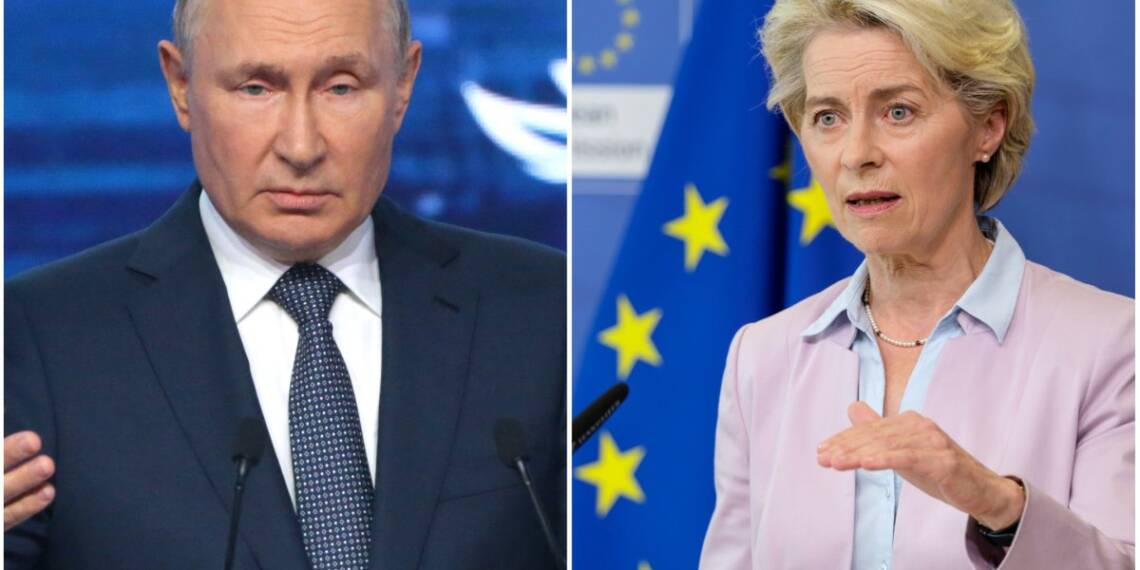On September 1, 2025, European Commission President Ursula von der Leyen announced increased funding for Lithuania to enhance surveillance of trains traveling between mainland Russia and its Kaliningrad exclave through Lithuanian territory. This initiative is part of a €357 million ($415 mn) EU program for border management and visa policy, with regular funding increases since 2021. The move comes amid heightened tensions due to the Ukraine conflict and Lithuania’s strategic position as a “frontline state” bordering Russia’s Kaliningrad region and Belarus.
During a joint press conference with Lithuanian President Gitanas Nausėda, European Commision President Ursula Von Der Leyen announced that the EU will increase funding for Lithuania to enhance surveillance of trains traveling between mainland Russia and its Kaliningrad exclave through Lithuanian territory.
She stated, “Lithuania has an EU program worth 357 million euros, intended for managing borders and visa policy. We launched it or agreed on it in 2021, and since then we have been regularly adding funds to it. For example, to expand surveillance capabilities, tracking trains. I can just imagine one of the trains passing through Lithuania between mainland Russia and Kaliningrad.” Von der Leyen described Lithuania as a “frontline state” facing “Russia in Kaliningrad” and accused Moscow of exerting “geopolitical and economic pressure” on its neighbor. She emphasized that the EU’s financial resources are directed toward strengthening border management, including “surveillance capacities [for] tracking the trains.”
What the EU is Trying to Do by Tracking Russian Trains
The EU aims to intensify monitoring of rail traffic to ensure compliance with sanctions imposed on Russia following the 2022 Ukraine conflict. Lithuania, as a transit route for goods and passengers between mainland Russia and Kaliningrad, is critical to enforcing these sanctions.
The tracking likely involves:
Sanctions Enforcement: Monitoring cargo to prevent the transport of sanctioned goods, such as military equipment or restricted materials, through EU territory.
Security Surveillance: Enhancing border security to counter perceived Russian geopolitical and economic pressure, including potential hybrid threats like cyberattacks or sabotage.
Border Management: Strengthening Lithuania’s border infrastructure, including surveillance technology and possibly helicopters, to improve monitoring capabilities
EU attempts to blockade Kaliningrad
The EU’s concerns stem from Lithuania’s proximity to Kaliningrad and Belarus, a Russian ally, heightens fears of Russian influence or hybrid attacks, especially after Lithuania’s 2022 decision to block sanctioned goods, which Moscow labeled a “blockade.”
The ongoing Ukraine conflict and Russia’s military activities raise concerns about potential escalation or provocations in the Baltic region.
Recently the EU has alao claimed that Russian GPS jamming had been deployed against its assets (e.g., the debunked claim involving von der Leyen’s plane in Bulgaria) fueling fears of Russian interference in critical infrastructure
Kaliningrad’s status as a Russian exclave within EU borders makes the rail corridor a potential flashpoint for diplomatic or military friction.
What the EU Will Do After Tracking
After enhancing train surveillance, the EU and Lithuania are likely to enforce stricter sanctions, Identify and block any prohibited goods, potentially escalating restrictions on Russian transit. Lithuanian President Gitanas Nausėda has proposed including additional Russian entities, like Rosatom, in the EU’s 19th sanctions package.
Strengthen Border Defenses: Use the €357 million program, and potentially an additional €100 million requested by Lithuania’s Interior Ministry, to bolster border security with physical barriers (e.g., “dragon’s teeth”) and advanced technology.
Increase Military Presence: The EU’s broader €2 trillion draft budget (2028–34) includes a fivefold increase in military spending and €800 billion for the Security Action for Europe (SAFE) initiative, suggesting a long-term militarization strategy.
Diplomatic Measures: Coordinate with NATO and other EU states to counter perceived Russian threats, as evidenced by Lithuania’s push for more military aid to Ukraine and stronger sanctions
Russian Response
Russia has reacted critically to the EU’s actions. Russian officials, including Kremlin spokesperson Dmitry Peskov, have denied involvement in alleged incidents like GPS jamming, dismissing Western claims as baseless.
Moscow views the EU’s funding and surveillance as part of a broader anti-Russian campaign, accusing Lithuania and the EU of escalating tensions. In 2022, Russia labeled Lithuania’s sanctions enforcement as a “blockade” of Kaliningrad, though rail connections were later restored.
In response to perceived Western hostility, Kaliningrad opened the “Saved Europe Park,” displaying replicas of Soviet monuments demolished in Europe, signaling defiance against efforts to erase Russian historical influence.
The EU’s focus on tracking Russian trains reflects a broader strategy of containment and deterrence but risks escalating tensions in an already volatile region. The significant financial commitment (€357 million and growing) raises questions about resource allocation, especially when framed as “protection from Russia” amid unverified claims like the GPS incident. Critics, including some Russian sources, argue this could be a pretext for militarization or even money laundering. The constant EU meddling in the region may now result in a massive miscalculation, drawing the Baltics into a confrontation with Russia.
What the EU Will Do After Tracking:
After enhancing train surveillance, the EU and Lithuania are likely to:Enforce Sanctions Stricter: Identify and block any prohibited goods, potentially escalating restrictions on Russian transit. Lithuanian President Gitanas Nausėda has proposed including additional Russian entities, like Rosatom, in the EU’s 19th sanctions package








